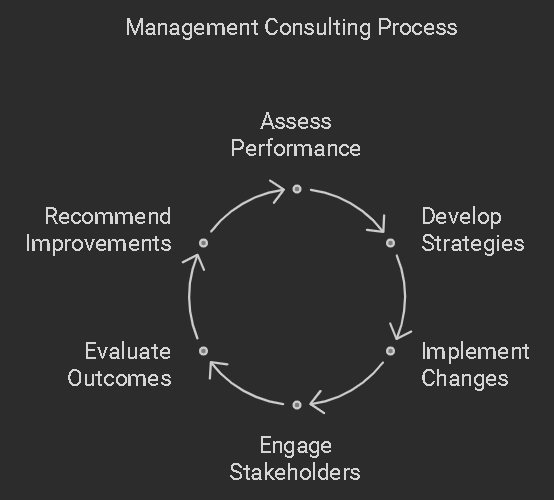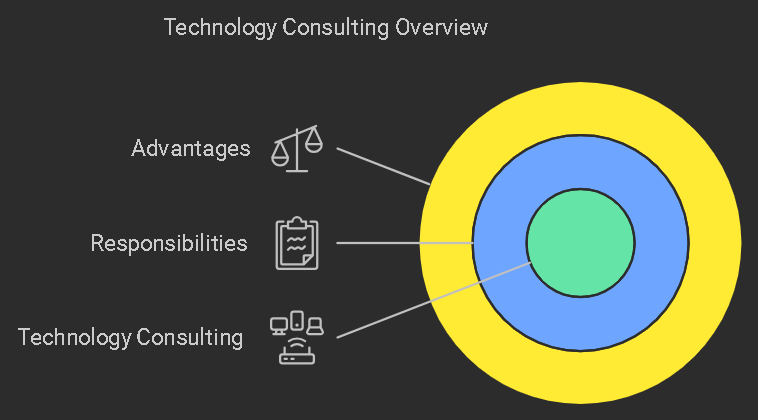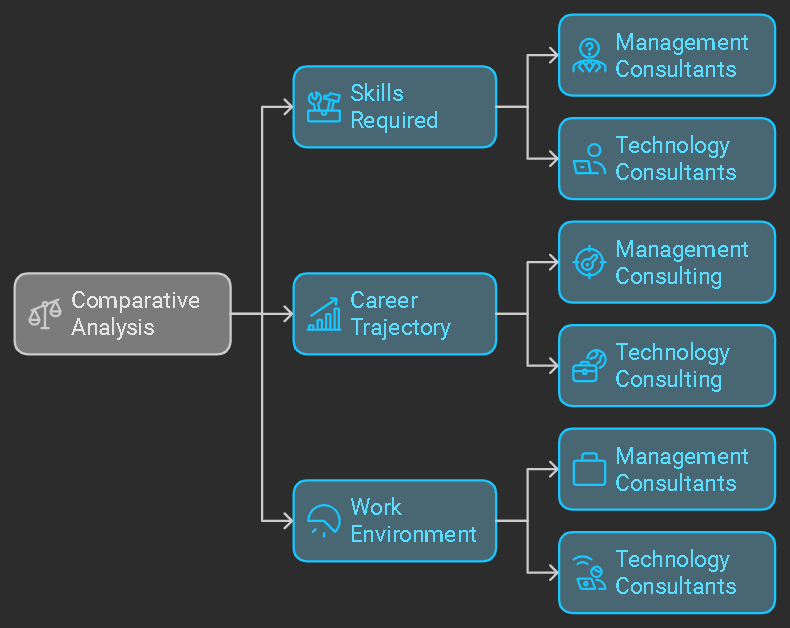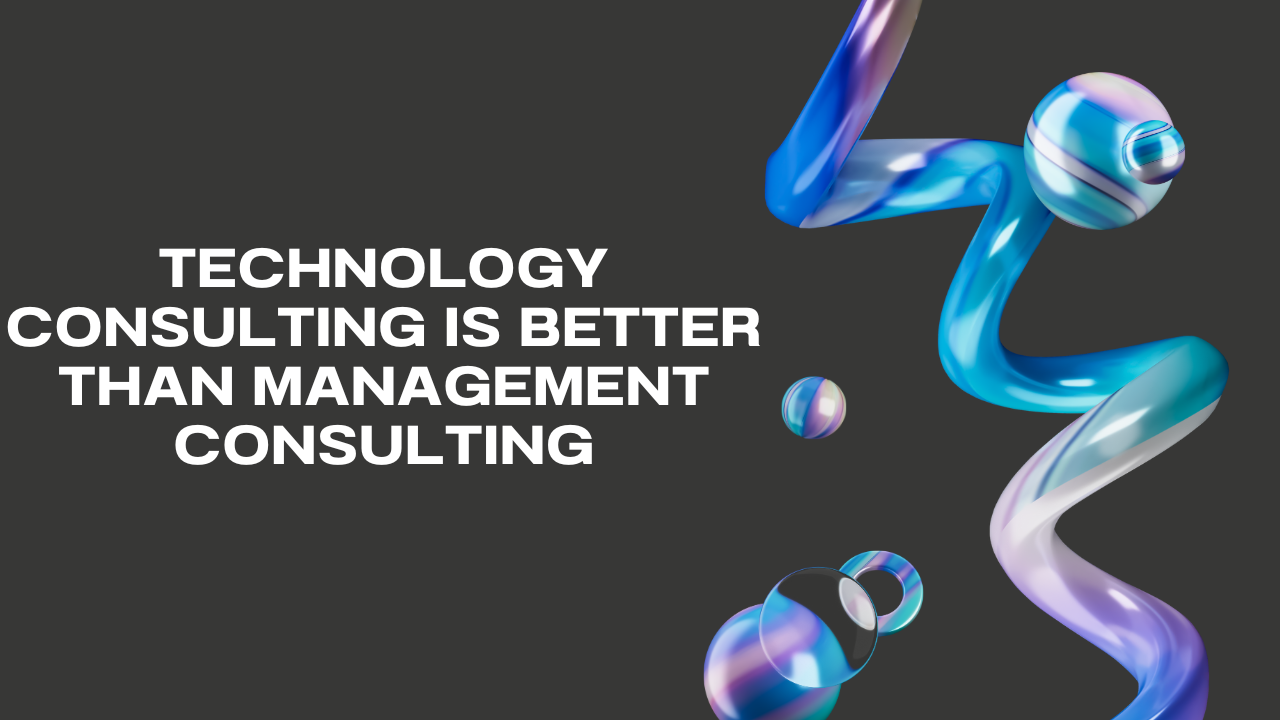The consulting industry plays a pivotal role in shaping the strategies and operations of businesses across various sectors. As organizations strive for efficiency and growth in an increasingly competitive landscape, consultants offer their expertise to identify challenges and implement solutions. Among the different branches of consulting, two prominent fields have emerged: management consulting and technology consulting. Each serves a distinct purpose, leveraging unique skills to address business needs.
In this blog, we will explore the differences between technology consulting and management consulting, examining their roles, responsibilities, advantages, and challenges. Our central question remains: Is one truly better than the other?
Overview of Management Consulting
Definition and Purpose
Management consulting primarily focuses on advising organizations on how to enhance their overall performance. Management consultants work to analyze various aspects of a business, including operations, strategy, marketing, and financial management. Their primary goal is to identify inefficiencies and recommend actionable strategies for improvement. This may involve organizational restructuring, developing market entry strategies, or implementing operational enhancements.
Responsibilities
- Performance Improvement: Management consultants assess and enhance operational efficiency to ensure organizations can function at their best.
- Strategic Planning: They help develop long-term strategies aimed at growth and sustainability, providing a roadmap for the future.
- Change Management: Consultants assist organizations in implementing changes effectively, ensuring smooth transitions during periods of transformation.
- Stakeholder Engagement: Working closely with senior management and stakeholders, management consultants align solutions with organizational goals and ensure buy-in from key players.

Advantages of Management Consulting
- Broad Scope: Management consultants often work across various sectors and industries, providing a diverse range of experiences that can enhance their expertise.
- High Demand: There is a consistent demand for management consultants as businesses seek to navigate complex challenges, making this a stable career choice.
- Prestige and Career Opportunities: Top firms like McKinsey, Bain, and BCG are highly regarded in the industry, often leading to prestigious career paths and networking opportunities.
Overview of Technology Consulting
Definition and Purpose
Technology consulting, on the other hand, focuses on leveraging technology to solve business problems and enhance operational efficiency. Technology consultants help organizations implement technological solutions tailored to their specific needs, ranging from software development to data analytics and cybersecurity. Their work often bridges the gap between business strategy and IT implementation.
Responsibilities
- Technology Implementation: Technology consultants are responsible for designing and deploying technology solutions that meet business objectives, ensuring systems align with organizational goals.
- System Optimization: They analyze existing technology systems to identify areas for improvement, enhancing performance and efficiency.
- Technical Support: Providing ongoing support and maintenance for technology solutions is a crucial aspect of their role, ensuring that systems operate smoothly over time.
Advantages of Technology Consulting
- Rapid Growth in the Tech Sector: The technology sector is expanding quickly, leading to a high demand for skilled technology consultants, making it an exciting field to enter.
- Hands-On Work: Technology consultants often engage directly with systems and processes, making their work more tangible and impactful.
- Higher Compensation Potential: In many cases, technology consulting roles offer competitive salaries that can surpass those in management consulting as professionals gain experience and expertise.

Comparative Analysis
Skills Required
While both management and technology consultants need strong analytical and communication skills, their specific skill sets differ significantly:
- Management Consultants require expertise in business strategy, finance, marketing, and organizational behavior. They must excel in critical thinking, problem-solving, and stakeholder management to effectively drive organizational improvements.
- Technology Consultants must possess a deep understanding of IT infrastructure, software development, data analysis, and emerging technologies. They need technical skills that enable them to implement and optimize technological solutions, as well as an ability to communicate complex tech concepts to non-technical stakeholders.
Career Trajectory
The career progression paths in both fields vary:
- Management Consulting typically offers a more structured career path, with clearly defined roles at each level. Promotions often come with significant salary increases, and many management consultants aim to reach senior positions like partner or director within prestigious firms.
- Technology Consulting can provide varied career paths that may lack the same level of structure as management consulting. While there are opportunities to advance into leadership roles, consultants may also pivot into roles such as product management, data analytics, or IT strategy, allowing for greater flexibility based on personal interests and market trends.
Work Environment
The work-life balance and demands in each consulting field can differ significantly:
- Management Consultants often face demanding hours due to project deadlines and high client expectations. The nature of their work may require extensive travel and long hours, especially during peak project phases. This can lead to a challenging work-life balance, particularly for those who value flexibility.
- Technology Consultants may experience more variability in their schedules, depending on project requirements and client needs. While they can also face intense workloads during critical project phases, the tech sector may offer more remote work opportunities and flexible arrangements, potentially leading to a better work-life balance.

FAQs Section
FAQs
1. What is the main difference between management consulting and technology consulting?
Management consulting focuses on improving an organization’s overall performance through strategic planning, performance enhancement, and change management. In contrast, technology consulting centers around leveraging technology to solve business problems and optimize operations.
2. What skills are essential for a management consultant?
Management consultants need strong analytical skills, business acumen, communication abilities, and expertise in areas such as finance, marketing, and organizational behavior. They must also excel in stakeholder engagement and problem-solving.
3. Are technology consultants in high demand?
Yes, technology consultants are currently in high demand due to the rapid growth of the tech sector. Organizations are increasingly looking for experts who can implement and optimize technology solutions to remain competitive.
4. What career paths are available in management consulting?
Management consulting typically offers a structured career trajectory, allowing professionals to advance from entry-level positions to roles like consultant, manager, and eventually partner or director within a firm.
5. Can technology consultants work remotely?
Many technology consulting roles offer flexibility in work arrangements, including remote work options. This can vary based on the specific company and project requirements, but the tech sector generally promotes a better work-life balance.
6. How does compensation compare between the two fields?
Technology consulting often offers competitive salaries that can surpass those in management consulting, especially as professionals gain experience. However, both fields provide lucrative compensation packages, depending on the specific firm and role.
7. What educational background is recommended for entering either field?
A degree in business, management, or a related field is beneficial for management consulting, while technology consulting typically requires a background in computer science, information technology, or engineering. Advanced degrees, such as an MBA or specialized tech certifications, can enhance career prospects in both areas.
8. Which consulting field is better for career growth?
Both fields offer strong career growth opportunities, but the trajectory can differ. Management consulting provides a more structured path with clear promotion milestones, while technology consulting offers varied roles and the flexibility to pivot based on market trends and personal interests.
Final Thoughts
In summarizing the key points discussed, both technology consulting and management consulting serve crucial roles in helping organizations thrive, but they cater to different interests and skills. Management consulting focuses on strategic organizational improvement, while technology consulting emphasizes the implementation of tech solutions.
Addressing the central question, whether technology consulting is better than management consulting ultimately depends on individual career goals, interests, and preferred working environments. Those who enjoy strategic problem-solving across various business functions may find management consulting more appealing, while those who prefer hands-on technical work might gravitate towards technology consulting.

















